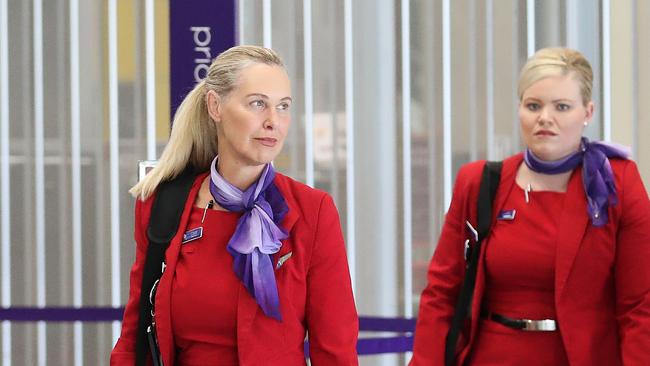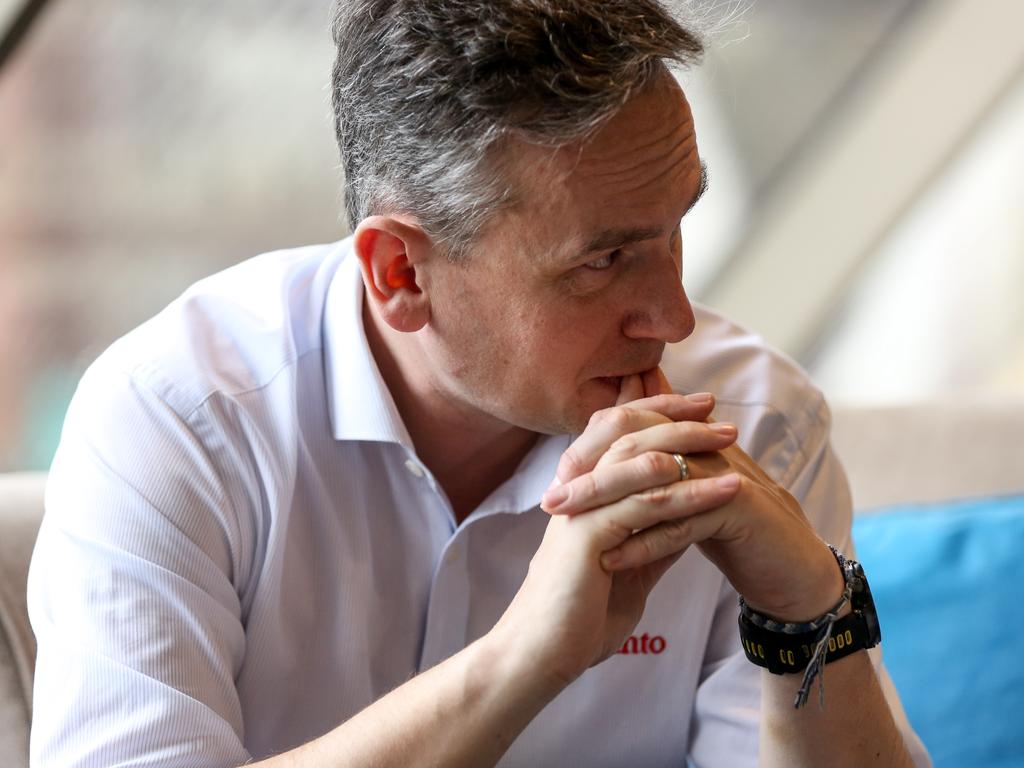
The actual cash being handed over is just a little short of the $726.3m equity value of the company when it called in Deloitte as the administrator in April.
Debt at the time was $6.8bn.
Separately, chief customer officer Danielle Keighery will resign from the airline to take up the role as chief customer officer for BoQ, based in Sydney
Bain won’t refinance the company until after receiving formal clearance at the creditors’ meeting on Friday week, but while taking on responsibility for the liabilities, actual cash changing hands is just $447m to cover unsecured creditors, with another $125m available for a profit share with the unsecured creditors.
Unsecured bondholders will get between 9c and 13c in the dollar, which compares to the 10c price of the bonds when the company called in Deloitte on April 21.
Public company takeovers typically see shareholders receive a premium of about 25 per cent on the last share price, but in this case Bain is picking up the pieces at closing prices.
It has already injected $125m to keep the place afloat.
The company received $49.3m in JobKeeper payments from the federal government, plus about $1.2bn in subsidised flights during the pandemic according to the note to creditors.
Deloitte’s fees will total $26.8m, Clayton Utz will get $8.7m and Morgan Stanley and Houlihan Lokey will collect $16m in fees for advisory work.
Bain is taking on the risk of the airline actually making it through the pandemic, but will enjoy the upside if it does.
In the past two months it has worked with management led by Paul Scurrah, Deloitte and KordaMentha to restructure the airline, with the deals aimed at cutting the $6.8bn in debt.
A better idea on the path to the future will come when Bain files the papers for the debt issues to come.
Littleproud’s inquiry
The ACCC inquiry into supermarket supply chains is a joke inspired by Agriculture Minister David Littleproud’s political ambition with no regard for either the integrity of the regulator, producers or consumers.
It is bordering on political influence of the independent regulator by directing it to conduct what can only be a superficial look at the issues.
One insider described it as a “high-level” examination, which is Canberra code for lightweight.
On Wednesday, Littleproud unveiled a three-month inquiry into perishable goods supply chains with supermarkets.
Actual existence of issues is the first problem. For many of the sectors, the supermarkets are a dominant buyer of their produce and the real answer is diversification of outlets through exports and direct sales to consumers through farmers markets and online sales, among other means.
The big supermarkets have clear market power. The bargaining imbalance with suppliers is obviously in their favour but apart from stating the obvious, just what will the ACCC uncover in three months?
Supermarkets are also efficient vehicles to get produce to consumers, which is highly beneficial to suppliers.
The inquiry is meant to cover fruit and vegetables, dairy, meat of all sorts and dairy and the answers are due in November.
Two years ago the ACCC handed the government its report on the dairy industry, just one of the sectors covered, and it took 18 months to complete, resulting in an industry code.
This column rang around the farm sector on Wednesday morning and was surprised to learn that Littleproud’s office had been contacting the farm lobbies in recent weeks to see if they had any issues. In other words, he was trying to drum up an excuse to have an inquiry.
The NFF toed the line, saying: “Letting sunlight in across the whole food supply chain will benefit all involved, from farmers to consumers.”
True enough, but normally such investigations would come from the industry banging on doors in Canberra, complaining to the ACCC and/or direct to the media. Not much of this seems to have happened in this case.
In the middle of a pandemic, fights with the world’s digital platform behemoths, dealing with regulated monopolies, solving the country’s energy issues, an overly concentrated industrial sector, trying to combat cartel activity and continued lies from suppliers to dupe consumers, one might think the ACCC had more than enough on its plate.
At least Littleproud will be able to say he is doing something — the question is: for whom?
Paint revolution
While Dulux paint was flying off the shelves at Bunnings during the lockdown, a revolution was under way at parent company Nippon Paint with the Singapore-based Goh family taking 60 per cent of the $US30bn ($41bn) company.
The Goh family got into paints after World War II by reselling paint left behind by the British army in much the same way Brambles got its start with CHEP pallets.
The business started in 1949 and teamed up with Nippon in 1962 with a joint venture between Goh’s Wutherlam investment vehicle and Nippon.
Last week, the joint venture was dissolved in return for the Goh family lifting its stake in Nippon from 35 per cent to 58.7 per cent.
The company is the world’s fourth-biggest paint company behind US-based Sherwin Williams (Wattyl), PPG (Taubmans) and Dutch-based AkzoNobel, which controls the Dulux name in Asia and Europe.
The latter was achieved by buying ICI, which was also the Australian parent until it vacated Australia, leaving behind Orica.
Bansal cleans up
Cleanaway’s Vik Bansal ticked a few investor boxes in Wednesday’s results, which didn’t disappoint low expectations, successful integration of recycling company SKM and margin expansion from a business that works on exploiting local monopoles.
Little wonder his share price increased 8 per cent to $2.42, despite a fall in statutory profit by 6.6 per cent to $112.6m.
Earnings expansion was the sweet spot, rising 0.6 per cent to 22.5 per cent.
Bansal is adding a steady stream of new mandates and also moving heavily into recycling through, among other ventures, a planned waste-to-energy plant in Sydney and the new plastic recycling plant at Albury with Pact and Ashai.
His industrial waste comrades at Bingo didn’t fare so well with the heavily shorted stock down 6.6 per cent at $2.28.








Bain Capital will only hand over $700m in cash for control of Virgin Australia, well short of the $3.5bn price tag floated on the back of the second creditors’ report.